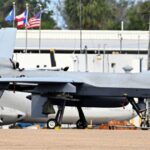Two U.S. Navy destroyers fought back this weekend against missile attacks aimed at American ships in the Red Sea.
“U.S. Navy destroyers USS Stockdale (DDG 106) and the USS O’Kane (DDG 77) successfully defeated a range of Houthi-launched weapons while transiting the Gulf of Aden, Nov. 30 — Dec. 1,” U.S. Central Command reported in a news release on its website.
“The destroyers were escorting three U.S. owned, operated, flagged merchant vessels, and the reckless attacks resulted in no injuries and no damage to any vessels, civilian or U.S. Naval,” the release said.
“The destroyers successfully engaged and defeated three anti-ship ballistic missiles (ASBMs), three one-way attack uncrewed aerial systems (OWA UAS), and one anti-ship cruise missile (ASCM), ensuring the safety of the ships and their personnel, as well as civilian vessels and their crews.”
The Houthis began attacking Red Sea shipping last October as a show of support for Hamas as Israel began its attacks into Gaza. Since January, the Biden administration has launched multiple bombing strikes in areas of Yemen held by the Iran-backed Houthi rebels, but it has not been able to halt the attacks.
The latest attacks came after the International Institute for Strategic Studies issued a report saying the time is right for a new policy against the Houthis.
“After 12 months of sustained attacks on Western shipping, it seems obvious that the current response by the international community has failed to reach its stated goals. Despite their military superiority, the U.S. and its allies have not seriously degraded the capability of the Houthis to launch attacks, nor their ability to resupply their arsenals,” the report said.
The report said the Houthis have emerged stronger within Yemen for having withstood the U.S. attacks.
The report said that while the U.S. and its allies lob bombs at the Houthis from time to time, “there appears to be no complementary political strategy.”
Will Trump make the U.S. more secure?
Yes: 100% (5 Votes)
No: 0% (0 Votes)
With that as the backdrop, Senior Vice President of the American Foreign Policy Council Ilan Berman wrote an Op-Ed posted by Newsweek, saying President-elect Trump needs to make the Houthi issue a top priority and noting that Red Sea trade has dropped 90 percent in the past year, which has impacted more than 65 nations.
Egypt alone, he wrote, has lost $6 billion in trade.
“Worse, the Biden administration seems to have basically acquiesced to the current state of affairs in the Red Sea,” he wrote, noting that after Trump labeled the Houthis a terrorist group during his first term, Biden reversed that when he took office in 2021.
“A fresh look is sorely needed. And while the incoming Trump administration has already made clear that it is wary of widening regional military involvement, it still has the opportunity to recalibrate America’s approach on at least two fronts,” he wrote, noting that one is to not only declare the Houthis terrorists, but also pirates subject to vast punishments.
Berman said Iran needs to feel pressure to stop the Houthis.
“Washington so far has remained largely silent regarding Iran’s role in enabling Houthi attacks, despite authoritative evidence that weapons deliveries from the Islamic Republic are responsible for making the group’s activities possible. But Houthi predation could be curtailed dramatically if America and its allies move to a policy of extended attribution, whereby Houthi actions have consequences not only for the Yemeni terror group itself but for its paymasters in Tehran, as well,” he wrote.
Regardless of what action is taken, he wrote, the premise should be that “as far as Washington and its partners are concerned, Houthi misbehavior is being made possible by Tehran — and that, as a result, Tehran holds the key to getting its Yemeni proxy to stand down.”
“After years of policy drift, the incoming administration will need to figure out a way to rebuild America’s regional credibility in the Middle East, while simultaneously guaranteeing the security of commerce there,” he wrote.
“For Donald Trump, who stressed the need for fresh economic policies while on the campaign trail, setting his sights on the Houthis would simply constitute good business.”
Advertise with The Western Journal and reach millions of highly engaged readers, while supporting our work. Advertise Today.






